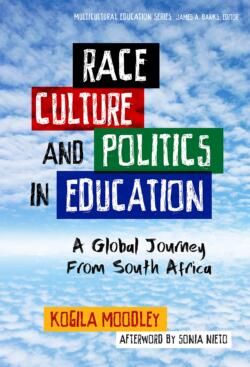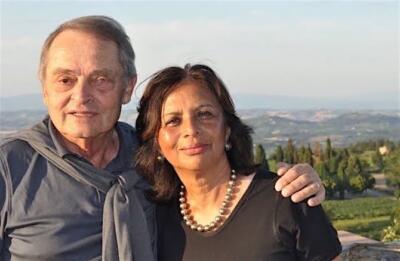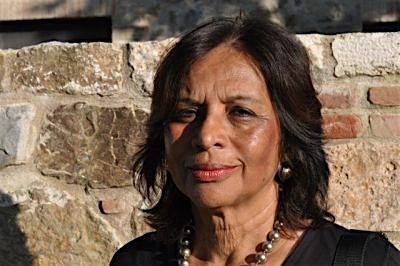1365 A journey from South Africa
Race, Culture, and Politics in Education: A Global Journey From South Africa
by Kogila Moodley, with an afterword by Sonia Nieto
Columbia University: Teachers College Press, 2020
$34.95 (U.S.) / 9780807764886
Reviewed by Isabel Nanton
*
 A successful blend of personal memoir and insights culled from an extensive academic career, Kogila Moodley’s book, which forms part of a series of 70 books aimed at multicultural educators in North America, is germane for a wide readership. Eminently readable, clearly stated with a strong narrative arc, Race, Culture, and Politics in Education: A Global Journey From South Africa is grounded in the sociology of education that has been Moodley’s life and work, most recently at the University of British Columbia, where she was the first holder of the David Lam Chair of Multicultural Studies. Her teaching style encourages discovery rather than indoctrination, guiding readers to absorb and synthesize new information to help them navigate our modern era where identity is key.
A successful blend of personal memoir and insights culled from an extensive academic career, Kogila Moodley’s book, which forms part of a series of 70 books aimed at multicultural educators in North America, is germane for a wide readership. Eminently readable, clearly stated with a strong narrative arc, Race, Culture, and Politics in Education: A Global Journey From South Africa is grounded in the sociology of education that has been Moodley’s life and work, most recently at the University of British Columbia, where she was the first holder of the David Lam Chair of Multicultural Studies. Her teaching style encourages discovery rather than indoctrination, guiding readers to absorb and synthesize new information to help them navigate our modern era where identity is key.
Moodley’s own identity is strong, providing a firm springboard for a life that has taken her from her native South Africa to study and teach in Germany, Canada, the USA, and other countries. The oldest of four siblings of a Tamil-speaking Hindu family who came originally to South Africa as indentured labourers, Moodley sets a warm-hearted tone describing her “relative privilege as an Indian South African,” a life which, while certainly not devoid of prejudice against her colour, gave her agency and confidence in who she was and is, whether listening to her paternal grandfather telling gripping stores in Tamil or Uncle KR the ice cream tycoon of the Crystal Ice Cream Parlour.

Under the race-based Group Areas Act, Moodley’s family was evicted from their family home — a life-changing event recounted with equanimity, as are the frightening 1949 African riots against South African Indians, riots that were terrifying for an eight-year old girl. Subsequently, Moodley became politicized in high school while apartheid bit ever deeper into the country’s social fabric, her trademark even-handedness balancing the story by recounting such incidents as her conservative high school headmistress allowing Moodley to raise funds in school for the Defence Fund for those detained.
Never portraying herself as a victim, when the Sixties arrive Moodley plunges into the maelstrom of race relations in the USA while studying for her masters at the University of Michigan. In a book of smooth and integrated transitions both philosophically and structurally, she then devotes two chapters to what we can all learn from Mahatma Gandhi and Nelson Mandela. Even when discussing Gandhi’s shortcomings, she maintains an even tone while analysing his modus operandi and focusing on “the development of ideas of ‘moral power’ and ‘shaming’ as tools for resistance” — shaming deployed when many years later Moodley and her Canadian then-teenage daughters are refused service in a South African Wimpy bar.
An analysis follows of Mandela’s template for peaceful co-existence, a man who “never wallowed in victimhood but stressed agency.” As Moodley points out, Mandela considered that “demonizing a hated enemy as evil is counterproductive to peaceful co-existence.”

Another theme that emerges from her observations of Mandela’s style is the importance of language in diffusing tensions. Learning the Afrikaans language of his oppressors, the better to engage with his prison wardens, Mandela considered direct communication key. When Moodley and her husband sociologist Heribert Adam (with whom she has co-authored books) later spend time in Cairo, she lauds its citizens’ cosmopolitan facility with languages. “In the Middle East multiple origins seemed coherent and unconflicted in defining a person’s identity,” she concludes. Her thoughts on the importance of language put this reviewer in mind of a portrait hanging in the Fitzwilliam Museum in Cambridge of two women travellers whose father would only fund their travel to a foreign country when they had learned its language.

In a multiracial relationship with German-born Adam, Moodley writes of their “enduring friendship” despite the challenge of their 1966 meeting and subsequent socializing being unlawful in South Africa. Together they appreciate time spent in Berlin observing how Germany, “a country shattered from an inconceivable past,” deals with that past. Kenyan-born myself, I could relate to Moodley spending the first third of her life in sub-Sahara Africa and to her telling comment that “in human relations, Africans excel,” this after arriving in Canada in 1968 to pursue an academic career with Adam, where both sought the “warmth that African society exudes, to which we had both become accustomed.”
For a book aimed at teacher education, the final chapter, where Moodley examines political literacy as a strategy for combating bigotry, is understandably its most academic. In her round-up of conclusions she provides a solid, clearly-stated blueprint not only for teachers but also for a wider audience of readers wishing to learn how to navigate our complex multicultural globe.
*
Kenyan-born author and Cambridge Press Fellow Isabel Nanton specializes in writing about East Africa and Western Canada. She has also reviewed books for the The Globe and Mail, The Vancouver Sun, and Old Africa magazine in East Africa.
*
The Ormsby Review. More Books. More Reviews. More Often.
Publisher and Editor: Richard Mackie
The Ormsby Review is a journal service for in-depth coverage of BC books and authors in all fields and genres. The Advisory Board consists of Jean Barman, Wade Davis, Robin Fisher, Cole Harris, Hugh Johnston, Kathy Mezei, Patricia Roy, Maria Tippett, and Graeme Wynn. Scholarly Patron: SFU Graduate Liberal Studies. Honorary Patron: Yosef Wosk. Provincial Government Patron since September 2018: Creative BC
“Only connect.” – E.M. Forster
4 comments on “1365 A journey from South Africa”